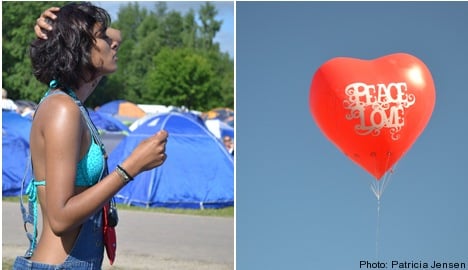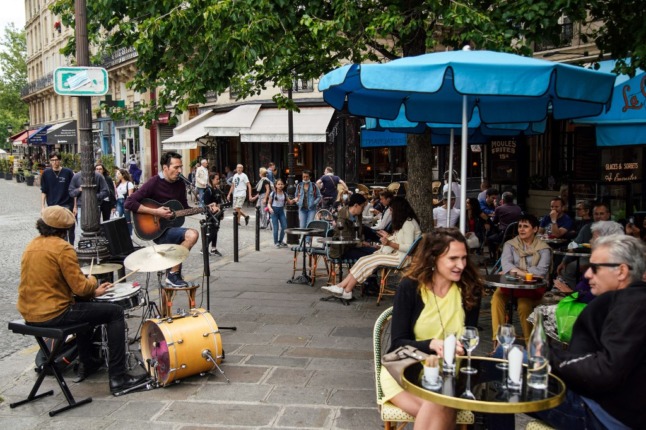People with cases of alcohol paraded the grounds already last Sunday, getting their bearings in a minefield of tents, boom boxes, camping chair circles and the odd wheelbarrow.
Coping with the blistering heat, festival-goers adorned sunglasses galore and there was not a pair of jeans in sight – over 20 degree weather all week called for sombreros, water guns and more. 30,000 campers, mostly teenagers, overran the area and made it their own.
Guitar playing, singing and smiles were as infectious as the anticipation for the shows to come, coupled with creativity in the form of beer can tower helmets to bikini-clad bodies wrapped in toilet paper attempting to present ‘the world’s largest mummy’.
Though this could be seen as a collection of the weird and wonderful, festival-goers high on adrenalin and the effects of early morning alcohol has its consequences.
Already on the first nights of the festival tents were drunkenly jumped on and demolished, whilst numerous rapes and attempted rapes were reported.
Thefts, assaults, vandalisms and drug related offences also on the list, it seemed like a disastrous start to this year’s Peace & Love theme of ‘Courage, Hope, and Love.’
Despite the destruction, the abundance of musical events at the Borlänge festival’s ten venues brought plenty of hype and good, clean fun to the crowds.
“I like lots of different musical genres from electro to metal, so getting to pick certain experiences each night depending on what I feel like was amazing. It’s a festival with such variety and I love it,” says Lars Andersson, 20, from Linköping.
Between shows one could see festival-goers flocking to nearby shopping center Kupolen, feverishly seeking wall outlets to charge mobile phones and stay connected to the world.
The daily charging sessions proved to be redundant at times, however, as the camping grounds and much of the festival grounds could be accurately renamed “the black hole of network signal”.
This was true especially during packed shows like the colorful, upbeat, modern rock anthem exhibit that was headliners Kings of Leon playing at midnight midweek on the ‘Utopia’ stage.
The festival in its entirety was nearly just that – a utopia.
Art lined every surface, down to velvet on tree trunks and fan-painted murals, and the booths scattered in every direction offered many styles of cuisine.
Other booths were stations where visitors of all ages could participate in activities including, but not limited to, face painting, getting ‘Hug me’ temporary tattoos and supporting various charities like Unicef and Amnesty through the Peace & Love Foundation.
The booths and human rights endorsement showed that the festival was not only about its extensive line-up boasting names such as legendary Bob Dylan and indie giants The Strokes but also about the opportunity for discussion and a forum for important world issues.
Though our fair Nordic country is, partly because of such philanthropic participation, often known as the welfare state – the artists coming from abroad to play at Peace & Love all seemed to have a soft spot for one thing in particular, and that wasn’t it.
“There are a lot of attractive girls walking around,” singer Sam Carter of British band Architects told The Local when asked to name his favorite thing about Sweden.
US-born pop/punk band All Time Low agreed and answered: “There are definitely beautiful people here,” while also mentioning their appreciation of the fact that “Europe has kind of embraced rock music forever.”
Artists described their Peace & Love experiences as “peaceful,” “beautiful,” and “chilled,” in comparison to 18-year-old festival-goer Simon Lundström’s account of “queues and chaos.”
Journey’s Jonathan Cain, when asked to compare festivals to individual shows, inferred: “There’s certainly a lot of chaos that goes along with this festival thing, but you have to take it as it comes.”
By the end of the week-long spectacle, visitors were accustomed to the routine bag-and-body checks at every gate, drunken shouts of both profanities and praise, bass beats that shook the ground beneath their feet and the realization that no one had washed in days.
What was prominent all round was that people were connecting through the discovery of new music, and the diversity of what was on offer successfully appealed to all festival-goers, however rowdy the fun might have become.
Irish political activist and founder of charity super-concert Live Aid, Bob Geldof, who spoke at the festival on Saturday, concluded that music is about ecstasy.
“The only way that we as human beings can celebrate the delirium of existence, the joy of being alive – there is only one language to do that, and it’s music.”
The language he speaks of was definitely spoken in Borlänge this past week by a record-high number of Peace & Love visitors, many of which are sure to exchange more words at future festivals.



 Please whitelist us to continue reading.
Please whitelist us to continue reading.
Member comments